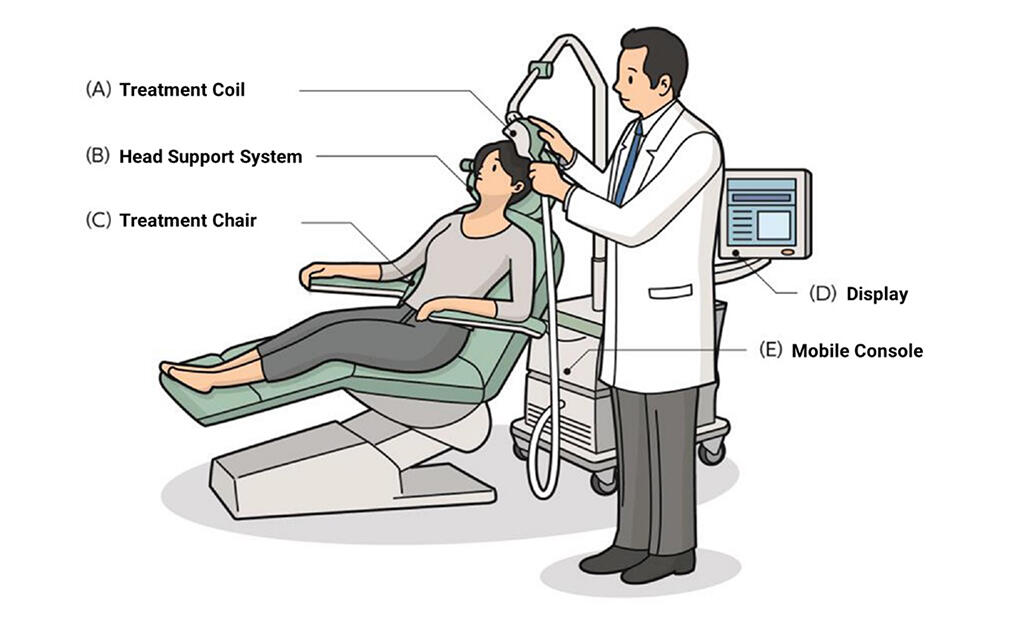A research group led by Dr. Shinsuke Kito, Director of the Department of Psychiatry, National Center of Neurology and Psychiatry, announced on May 13 that they will begin a physician-led clinical study of maintenance therapy using repetitive transcranial magnetic stimulation (rTMS) for treatment-resistant depression. The study will conduct maintenance therapy for 12 months following the six-week acute phase, which is covered by insurance, as an advanced medical treatment and verify its effectiveness. The group will seek to have it covered by insurance if its effectiveness is confirmed. The study will run for four years beginning May 1.

Provided by Japanese Society of Psychiatry and Neurology with modifications (反復経頭蓋磁気刺激(rTMS)適正使用指針 https://www.jspn.or.jp/modules/advocacy/index.php?content_id=3(Japanese))
The lifetime prevalence of depression in Japan is 6-7% (12-16% in the U.S.), and maintenance therapy following acute-phase treatment is thought to be important because of the tendency for relapse. There is a need to establish maintenance therapy to prevent recurrence of treatment-resistant depression that does not respond to drug therapy in particular.
Repetitive transcranial magnetic stimulation (rTMS) is a therapy for treatment-resistant depression. It was adopted in Japan as a treatment option for patients who do not respond to drug therapy and has been covered for up to six weeks by insurance since 2017.
The therapy works by non-invasively changing the excitability of neurons by externally applying magnetic stimulation to the brain cortex.
An overseas study (18 trials, 732 patients) examining the long-term effects of acute rTMS therapy confirmed that continued maintenance therapy contributes to this long-term effect. Moreover, it has been found that the gender of the patient (being female) contributes to the long-term effect, while other conditions such as the site of stimulation do not.
At the same time, the efficacy of maintenance therapy for treatment-resistant depression has not been verified in Japan or overseas, and no method of treatment has been established. The clinical study to be conducted in this case is aimed at establishing maintenance therapy to prevent recurrence of treatment-resistant depression.
Specifically, in addition to acute-phase rTMS therapy (up to six weeks) the study will evaluate the efficacy in adults with moderate or severe depression who do not respond to antidepressant drug treatment by comparing a group given 12 months of maintenance rTMS therapy to a group not given the therapy. The study includes a total of 300 patients with no allocations made between the group with and without maintenance rTMS therapy.
The study will be conducted as a multi-site, prospective, non-randomized longitudinal study, and treatment of the group with maintenance rTMS therapy will be performed under the Advanced Medical Care Program as a Type B Technology. The research group will also accept new medical facilities to participate in the study.
The subjects are patients who responded to acute rTMS therapy or relapsed and will receive rTMS therapy one day a week for the first six months of the maintenance phase and one day every other week for the second six months. The stimulation conditions are identical to those in the acute phase. The observation and evaluation periods are at three, six, nine, and 12 months of the maintenance period and at the final follow-up. The subjects will be enrolled until October 31, 2024. The cost for advanced medical treatment is 17,000 yen per rTMS therapy. The rTMS therapy will use equipment made by NeuroStar.
The research is subsidized by Teijin Pharma Limited, and while the support includes database operation costs, it does not include data. The equipment used will be that of each medical facility.
In a preliminary experiment, Dr. Kito and his colleagues have confirmed that a small number of patients with treatment-resistant depression who were in remission after acute-phase treatment have remained in remission after 12 months of maintenance rTMS therapy. If this study can confirm the treatments effectiveness, it is hoped that the therapy will be widely used as an effective treatment for treatment-resistant depression, and reduce the its cost in the future.
This article has been translated by JST with permission from The Science News Ltd.(https://sci-news.co.jp/). Unauthorized reproduction of the article and photographs is prohibited.




